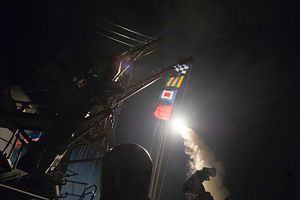Trans-Pacific View author Mercy Kuo regularly engages subject-matter experts, policy practitioners, and strategic thinkers across the globe for their diverse insights into the U.S. Asia policy. This conversation with Dr. Christina Lin – Fellow at the Center for Transatlantic Relations at the Paul H. Nitze School of Advanced International Studies (SAIS), Johns Hopkins University – is the 87th in “The Trans-Pacific View Insight Series.”
Explain the possible political motivation and strategic calculus behind recent U.S. airstrikes in Syria.
The U.S. decision to directly attack the Syrian government is a formal declaration of war following six years of indirect proxy warfare via Syrian rebel jihadi groups. It appears to be a show of force from the U.S. president that demonstrates he will act when red lines are crossed, unlike his predecessors in the Obama administration, and also dispels the ongoing Beltway narrative that the Trump administration serves Russia’s interests.
However, regardless of how much this serves U.S. domestic political interests, the negative fallout is that U.S. attacks on Syrian air assets, similar to Japanese attacks on U.S. naval assets in Pearl Harbor, would be deemed by some countries as an act of war.
The airstrikes occurred during the summit between Presidents Donald Trump and Xi Jinping in Florida. What is the symbolic and messaging impact of U.S. military actions on China-Russia relations?
The U.S. strike during the Trump-Xi summit is rather remarkable at a time of great uncertainty in East Asia. The key bilateral discussions were namely to thwart North Korea’s nuclear weapons program, U.S.-China trade, the South China Sea, and Taiwan.
By attacking Syria during the meeting with Xi, President Trump may be signaling that despite having a powerful patron such as Russia behind the Assad government, it will not deter U.S. military action. As such, he is serious about North Korea and Pyongyang may be next for U.S. air strikes, regardless of having China as a patron. The same message may be conveyed regarding U.S. potential action on Iran’s nuclear program despite having China and Russia as powerful allies.
If Syrian retaliation or escalation of regional tensions ensue in the coming days, what steps might China take to preserve its strategic interests in the Middle East?
As a recent Israeli intelligence report documented, there are thousands of Chinese Uyghurs fighting in the ranks of al-Qaeda affiliates and ISIS in Syria, namely in the Turkistan Islamic Party (TIP) based in Idlib — an al-Qaeda stronghold. The August 30, 2016 bombing of the Chinese embassy in Krgyzstan, planned by TIP in Syria and financed by Al Nusra, signals increasing threats to Chinese citizens and interests overseas if Syria becomes a terrorist safe haven.
Because of “inter-mingling” with Ahrar al Sham and other so called “moderate” jihadists, TIP and Nusra enjoy U.S. and its allies’ protection even though they are designated as terrorist organizations. The have procured advanced Western weapons such as U.S.-supplied anti-tank TOW missiles, Grad missiles, and likely anti-aircraft MANPADS, and drones that they used to record their recent suicide campaigns against the Syrian army. These Western weapons enhance their war fighting capabilities to launch future attacks on China and Chinese interests, so Beijing will likely step up its military support to the Syrian army. Chinese military advisers are already on the ground in Syria, according to media reports.
Identify the geopolitical risks of U.S. airstrikes in Syria on Israel.
U.S. military action opens the door for other direct foreign military attacks on the Syrian government, such as the Turkey/Saudi/Qatar axis that have been sponsoring the rebel jihadists in a regime change operation, with additional backing from other Arab Gulf states, Israel, and NATO.
This risks escalating the Syrian conflict into a regional and international war between the great nuclear powers of U.S., Russia, and China, with al-Qaeda, ISIS and their patrons benefiting from the additional chaos.
As such the conflict will invariably spill over into Israel, provoking Iran, Russia, and China to increase military support to the Syrian army, and perhaps draw in other states in the Shanghai Cooperation Organization that are concerned with Salafi jihadists from their region setting up a safe haven in Syria. Thousands of Central Asian militants mainly based in Idlib and Aleppo have been training and fighting alongside U.S./Western-backed groups to try to overthrow the Syrian government.
What three issues in China’s Middle East agenda should concern the U.S. administration?
China’s three main Middle East agenda items — or core interests — are energy access, market access, and protecting its citizens and assets. Because the Chinese regime is an unelected government, it derives its legitimacy by its credibility and capability to protect Chinese citizens from threats at home and abroad. As such, the non-interference policy does not apply and China will exhaust all means to protect its citizens when they are threatened.
The United States is currently operating with a blind spot toward Chinese concern over TIP/al-Qaeda gaining a safe haven from which to launch attacks on Chinese citizens. Thus, it is important to have a dialogue to identify what are legitimate Chinese interests and red lines to prevent misperception, miscalculation, and potential escalation into a military conflict. In 1950, the Chinese warned the U.S. not to cross the Yalu River in Korea, but we ignored their red line and ended up fighting the Chinese in the Korean War. Therefore, it behooves the U.S. establishment to learn from history.

































